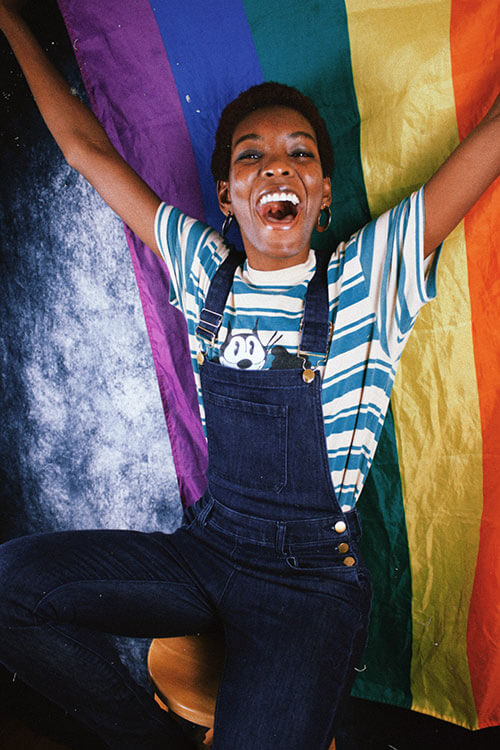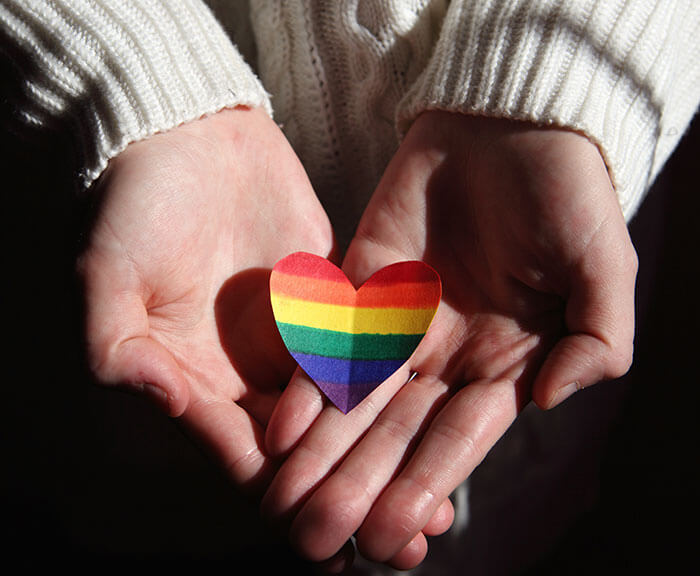
Covenant House, the largest provider of services to young people facing homelessness and survivors of human trafficking in the Americas, is committed to ensuring that all of our houses across our movement are welcoming, affirming, and safe for young people who identify as LGBTQ+.
That’s because LGBTQ+ youth experience a much higher risk of homelessness than their peers, and, once on the street, they face additional hardships because of stigma and discrimination. This is the reality for LGBTQ+ youth across the six countries where Covenant House works: the United States, Canada, Guatemala, Honduras, Mexico, and Nicaragua.
But not only are LGBTQ+ youth at higher risk of homelessness in the U.S., they also face, among all young people experiencing homelessness, greater risks of "high levels of hardship." Hardship includes higher rates of assault, trauma, exchanging sex for basic needs, and early death. Black youth who identify as LGBTQ+, particularly young men, experience the highest rates of homelessness.
In Latin America
young people who identify as LGBTQ+ in Honduras and Guatemala, in Central America’s Northern Triangle, face some of the worst discrimination, marginalization, and violence at the hands of family, peers, security forces, and gang members. A Human Rights Watch report issued in 2020 describes how LGBTQ+ young people face a “complex web of violence and discrimination” that threatens their physical safety, limits their life choices, may lead them to leave home, drop out of school, or, in some cases, to flee their country.

In Canada
lesbian, gay, bisexual, transgender, transexual, queer, questioning, and 2-spirited youth (LGBTQ2S+) are underrepresented in the general youth population, but, as in the U.S., they are overrepresented among all young people facing homelessness. It’s estimated that 25-40% of all young people facing homelessness in Canada identify as LGBTQ2S. In the shelter system, about 20% identify as LGBTQ2S. Too often, in shelters, these youth meet the same homophobia and transphobia they fled in their homes.
Recent Highlights
In 2021, Covenant House approved a new youth inclusion policy to guide the protection of LBGTQ+ youth at our sites and safeguard their rights. The new policy has been disseminated to all sites, a curriculum has been created, and webinars and in-person training takes place at sites to ensure comprehension and compliance.
In October of 2021, Covenant House Greater Washington began SHINE – a new safe space initiative created specifically for LGBTQ+ populations. The program provides emergency shelter, crisis stabilization, and short-term housing options to young people in the Greater Washington region. It consists of 24 beds, case management services, and an array of support from various community-based organizations currently working with LGBTQ+ youth. These trauma-informed services were created with the goal of positive youth development and are culturally appropriate and specific to LGBTQ+ youth.

Welcoming,
Affirming,
Safe

At Covenant House, our mission is one of unconditional love and absolute respect for all young people facing homelessness. Welcoming young people who identify as LGBTQ+ to our programs has been a part of who we are since our founding in 1972. Margaret Elisabeth, a member of the Covenant House Alumni Community, arrived at Covenant House Texas in the 1980s. They said,
"At Covenant House, I found the first person to take an interest in my life. In that moment, I didn’t feel homeless or like a marginalized kid."
- Margaret Elisabeth
Trauma-informed, Resilience-focused Approach to LGBTQ+ Homelessness
Youth who make their way to a Covenant House program do so bearing complex histories of trauma, including physical, sexual, and emotional abuse and violence in the home or on the streets. LGBTQ+ youth are further traumatized by the rejection they have experienced in their families, schools, and communities due to their gender identity or expression or sexual orientation.

Covenant House is aware of the trauma young people experience while facing homelessness as well as of their resilience. In partnership with Dr. Kenneth Ginsburg — specialist in adolescent medicine at The Children’s Hospital of Philadelphia, professor of pediatrics at the University of Pennsylvania School of Medicine, and medical director at Covenant House Pennsylvania — Covenant House developed a trauma-informed, resilience-focused approach to supporting and engaging the youth in our houses. Our approach, informed by the Reaching Teens model, trains our staff in core competencies such as understanding trauma, stress management and coping, restoring a young person’s sense of control, and reducing shame and stigma, among others.
This approach, together with the awareness we have raised among staff to ensure a welcoming, affirming, and safe space for LGBTQ+ youth, distinguishes Covenant House as a provider of shelter that addresses the whole person, with all of that young person's experience and potential.

All Are Welcome Here
Most LGBTQ+ young people access services from non-LGBTQ-specific agencies, according to True Colors United and The Williams Institute. At Covenant House, we’re proud of the diversity of the youth in our houses and the staff who welcome and serve them. All young people facing homelessness are welcome here and are embraced with unconditional love, absolute respect, and relentless support.
At Covenant House, diversity and inclusion don't end at intake. Our youth share dormitories, dining tables, and classrooms. They share in the same opportunities for entertainment, self-improvement, worship, exercise, group counseling, field trips, creative workshops, and all other activities.
Diversity can be challenging, but we strive to build understanding among each other at Covenant House, where our residents are, indeed, a microcosm of the surrounding society. We hope that as our youth progress toward their goal of independent living they will take with them a deepened understanding and respect for one another into the rest of their lives.
Resources
"LGBTQ Youth Homelessness in America," Voices of Youth Count, Chapin Hall, University of Chicago, 2018; "Without a Home: The National Youth Homelessness Survey," 2016; “‘Every Day I Live in Fear’: Violence and Discrimination Against LGBT People in El Salvador, Guatemala, and Honduras, and Obstacles to Asylum in the United States,” Human Rights Watch, Oct. 7, 2020.